Unit 2 What happened to your neck? Lesson 5 & Lesson 6 课件(共66张PPT)
文档属性
| 名称 | Unit 2 What happened to your neck? Lesson 5 & Lesson 6 课件(共66张PPT) |

|
|
| 格式 | pptx | ||
| 文件大小 | 4.7MB | ||
| 资源类型 | 试卷 | ||
| 版本资源 | 北京版 | ||
| 科目 | 英语 | ||
| 更新时间 | 2023-07-25 08:47:24 | ||
图片预览

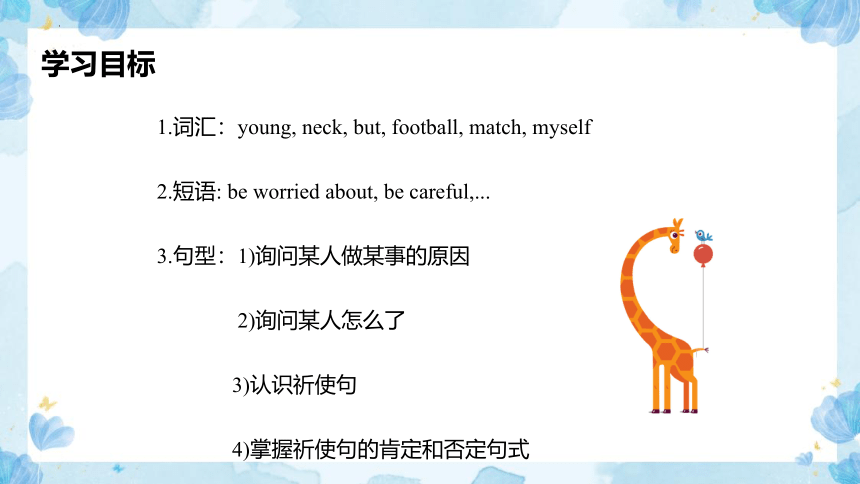
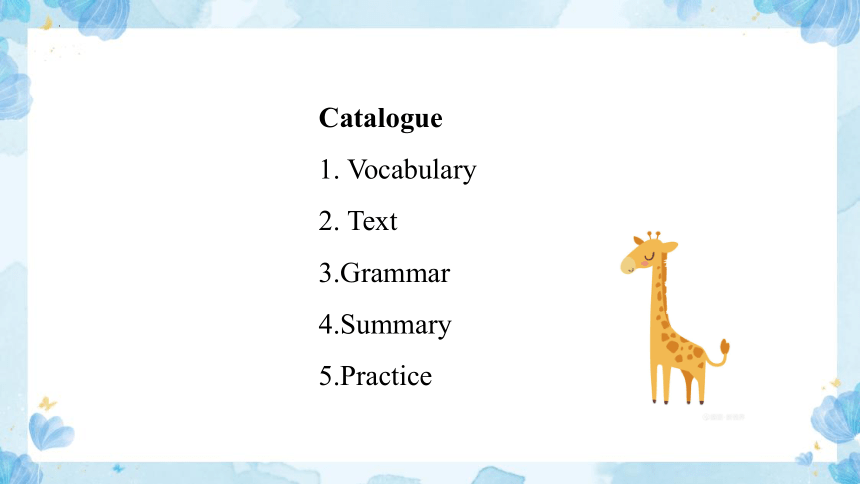
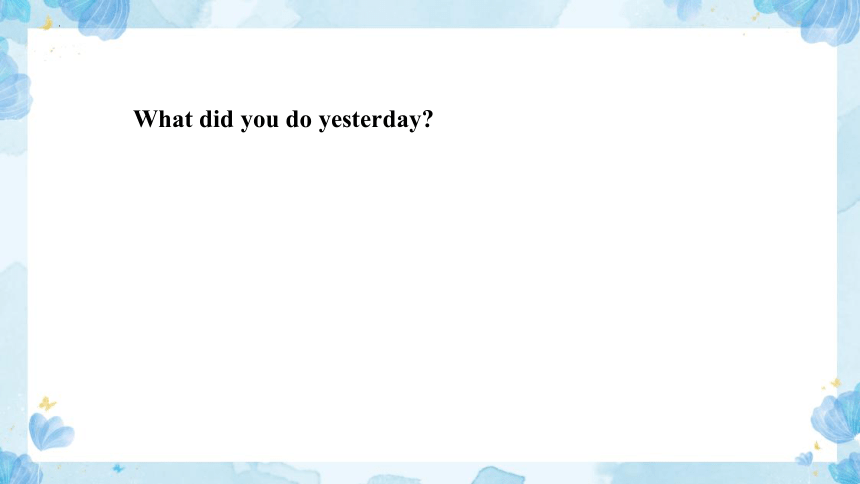
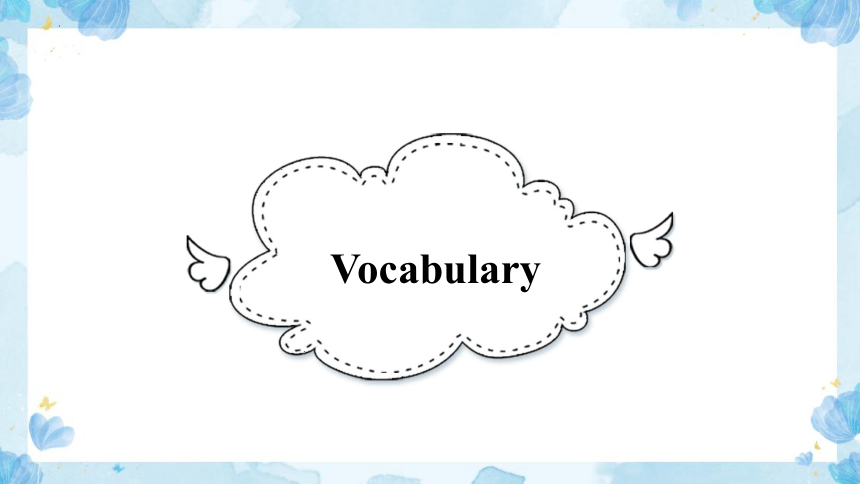
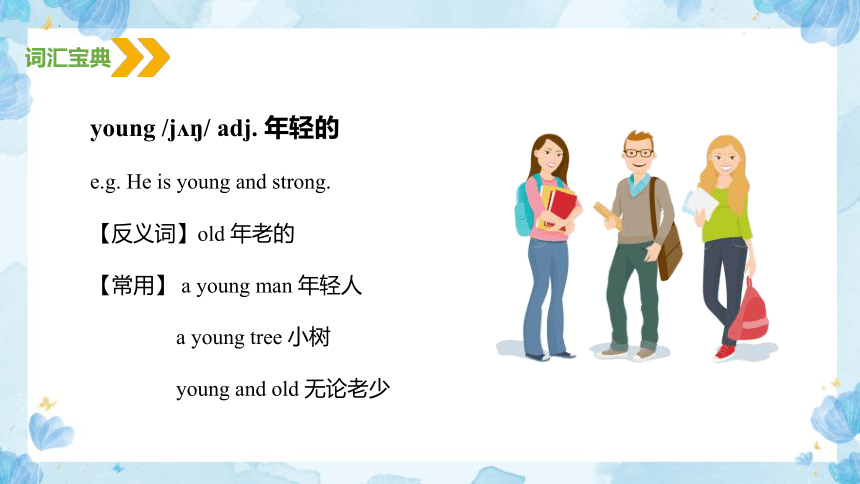
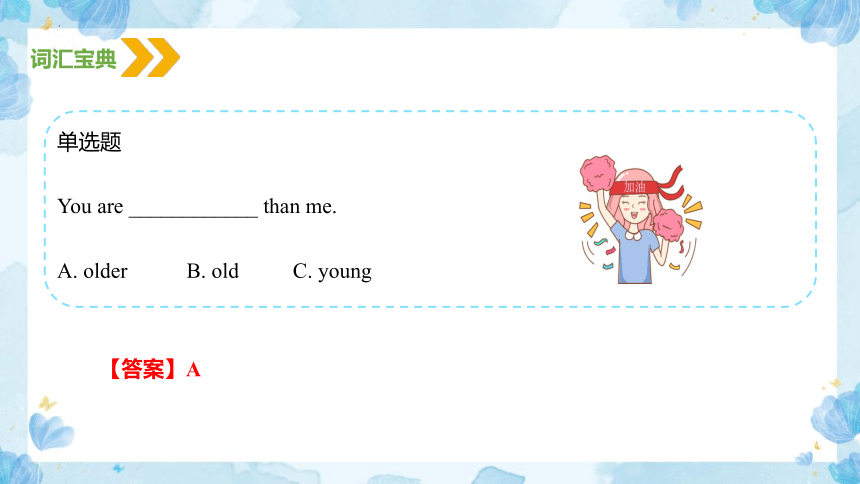
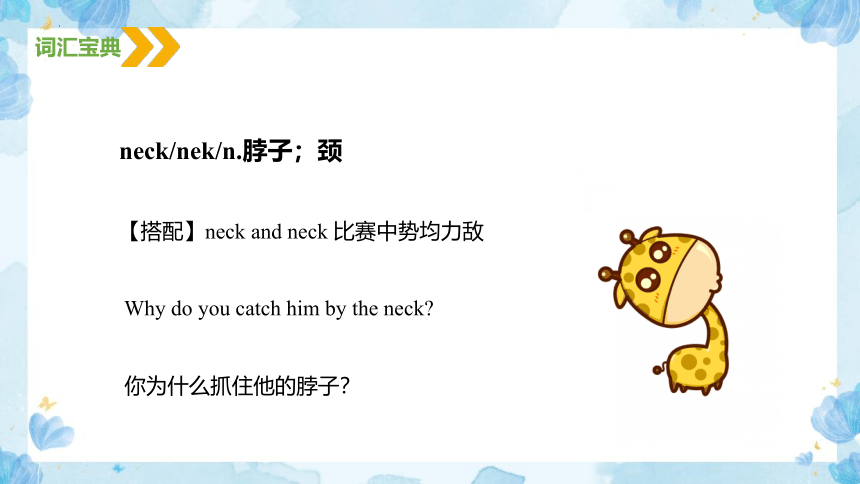

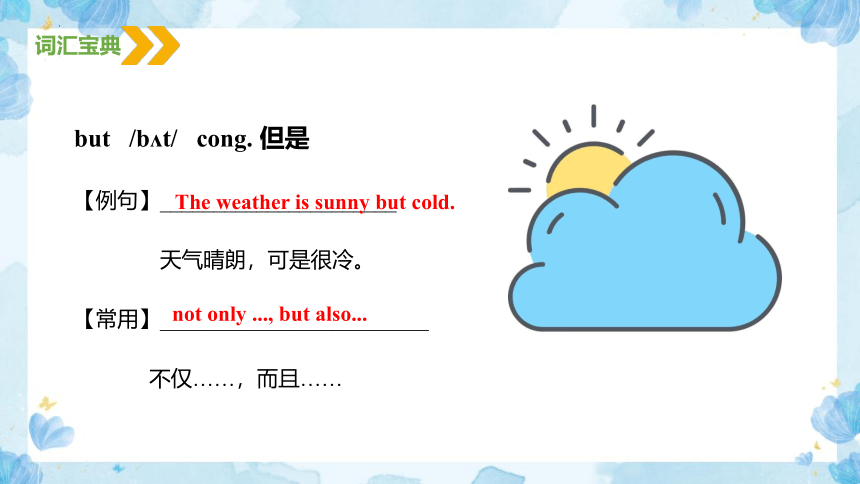
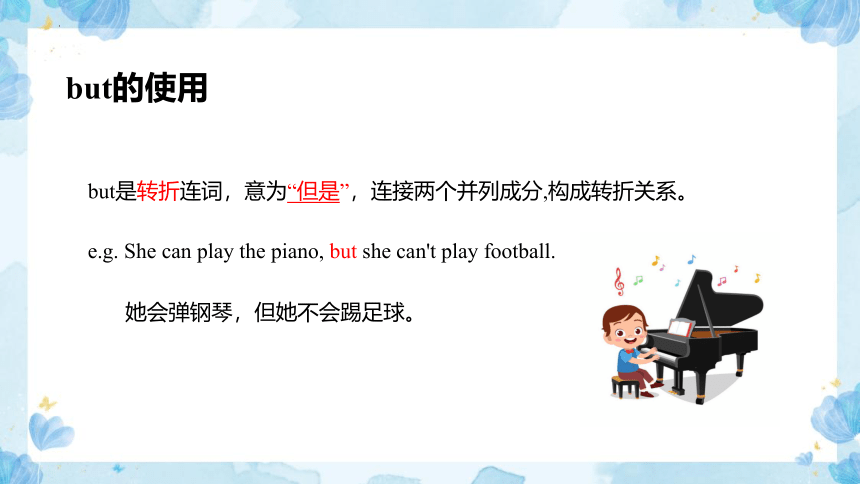

文档简介
(共66张PPT)
Unit 2 What happened to your neck
Lesson 5 - Lesson 6
1.词汇:young, neck, but, football, match, myself
2.短语: be worried about, be careful,...
3.句型:1)询问某人做某事的原因
2)询问某人怎么了
3)认识祈使句
4)掌握祈使句的肯定和否定句式
学习目标
Catalogue
1. Vocabulary
2. Text
3.Grammar
4.Summary
5.Practice
What did you do yesterday
Vocabulary
词汇宝典
young /j / adj. 年轻的
e.g. He is young and strong.
【反义词】old 年老的
【常用】 a young man 年轻人
a young tree 小树
young and old 无论老少
单选题
You are ____________ than me.
A. older B. old C. young
词汇宝典
【答案】A
词汇宝典
neck/nek/n.脖子;颈
【搭配】neck and neck 比赛中势均力敌
Why do you catch him by the neck
你为什么抓住他的脖子?
词汇宝典
答案:neck
根据汉语意思填空。
宝宝的脖子很痛。
Baobao's _______ aches terribly.
词汇宝典
but /b t/ cong. 但是
【例句】______________________
天气晴朗,可是很冷。
【常用】_________________________
不仅……,而且……
not only ..., but also...
The weather is sunny but cold.
but的使用
but是转折连词,意为“但是”,连接两个并列成分,构成转折关系。
e.g. She can play the piano, but she can't play football.
她会弹钢琴,但她不会踢足球。
but的使用
“但是”。表示转折,一般用于否定句。
e.g. He likes the piano but doesn't like the violin.
他喜欢钢琴,但不喜欢小提琴。
中译英:我喜欢香蕉但我不喜欢苹果。
I like bananas ____________________________.
but I don’t like apples.
词汇宝典
football / f tb l/ n. 足球
联想 basketball 篮球 ping-pong 乒乓球
巧记 :foot(脚)+ball(球)=football (足球)
例句:They like playing football.他们喜欢踢足球。
【拓展】 football team 足球队 football fan 足球迷
football match 足球比赛
单选题
John is good at _______ football.He wants ______ a football player.
A. play; to be B.playing; to be C. plays; be D. playing;be
词汇宝典
【答案】B
分析:考查动名词和动词不定式。第一个空is good at…..擅长于…为固定结构,at为介词,后面用动词的动名词形式,所给动词play的动名词形式为playing;第二个空want to do为固定用法,译为:想做…to do为动词不定式,be a football player成为一个足球运动员,be放在to的后面用动词原形。故选:B。
词汇宝典
match/m t /
n.1.火柴:不要玩火柴。
Don't play with matches.
2.比赛:
Are you going to watch the the football match on Sunday
你星期天去看足球赛吗?
词汇宝典
match/m t /
【常用】a match 一根火柴
a box of matches 一盒火柴
hold a match 举行比赛
play a match 参加比赛
watch a match 观看比赛
win a match 赢得比赛
单选题
There _____ a football match between Class 1 and Class 2 next week.
A. will have B. will being C. is having D. is going to be
词汇宝典
【答案】D
词汇宝典
myself /ma self/ pron.[代词] (I的反身代词)我自己
【例句】I can look after myself.我能照顾我自己。
I can buy myself lots of good things.
我可以给自己买许多东西。
【联想】ourselves 我们自己yourself 你自己 yourselves 你们自己
himself 他自己herself 她自己themselves 他们自己
itself 它自己 oneself 自己,自身
词汇宝典
句型转换
I learned English all by myself. (改为同义句)
I ______________ English.
【答案】taught myself
【分析】考查同义句转换。learn by oneself译为:自学,同义短语是teach oneself。由learned可知题干时态是过去式,teach的过去式是taught,我自己是myself。故答案为: taught myself。
Text
Lesson 5
文中探宝
Doctor: What's wrong with you, young man You don't look well today.
Mike: No, I don't, Doctor. My neck aches terribly.
Doctor: What happened to your neck
Mike: I stood on my head this afternoon and hurt my neck.
Doctor: Why did you stand on your head
Mike: Because I wanted to practice kung fu. I'm very interested in it. I thought it was easy but it wasn't.
Doctor: That was very dangerous, young man. You are lucky you didn't break your neck. But we' ll have to take an X-ray first.
文中探宝
Doctor: What's wrong with you, young man You don't look well today.
Mike: No, I don't, Doctor. My neck aches terribly.
Doctor: What happened to your neck
Mike: I stood on my head this afternoon and hurt my neck.
Doctor: Why did you stand on your head
Mike: Because I wanted to practice kung fu. I'm very interested in it. I thought it was easy but it wasn't.
Doctor: That was very dangerous, young man. You are lucky you didn't break your neck. But we' ll have to take an X-ray first.
你怎么了?当某人不舒服的时候询问
年轻人
脖子
倒立
be interested in 对...感兴趣
stand on my head 倒立
be interested in 对……感兴趣
take an X-ray 拍一张片子
重点知识点
文中探宝
-- Why did you stand on your head
-- Because I wanted to practice kung fu.
Listen, look and learn
文中探宝
Listen and decide
( )1. Lucy will go to school tomorrow.
( )2. Lucy hurt her leg.
( )3. Lucy had a blood test.
文中探宝
Let's do
Ask and answer.
Lesson 6
文中探宝
Mum: What happened to you, Yangyang
Yangyang: Oh, Mum, we had a football match, and I hurt my right leg.
Mum: You hurt yourself again!
Yangyang: Don't be upset, Mum. It's only a scratch. It will be all right next week, and I can play again.
Mum: I'm really worried about you. Be careful when you play.
Yangyang: OK, I'll be very careful. I won't hurt myself again.
Mum: That sounds good.
文中探宝
Mum: What happened to you, Yangyang
Yangyang: Oh, Mum, we had a football match, and I hurt my right leg.
Mum: You hurt yourself again!
Yangyang: Don't be upset, Mum. It's only a scratch. It will be all right next week, and I can play again.
Mum: I'm really worried about you. Be careful when you play.
Yangyang: OK, I'll be very careful. I won't hurt myself again.
Mum: That sounds good.
发生什么?
足球比赛
摔了右腿
别沮丧。
我真的很担心你。 仔细点。
听起来不错
a football match 一场足球比赛
hurt my right leg 我的右腿受伤了
be worried about 担心
be careful 小心
重点知识点
文中探宝
-What happened to you
-I hurt my right leg.
Listen, look and learn
摔了右腿
我的猫抓了我
我摔断了胳膊。
文中探宝
Listen and match
文中探宝
Let’s do
Sentences
1.—What's wrong with you, young man 你怎么了,年轻人?
详解:当看到他人身体不舒服时,可用“What's wrong或"What's wrong with ”询问对方。
举一反三:—What's wrong with Bob 鲍勃怎么了?
— He hurt his hand. 他伤着手了。
Sentences
2.—What happened to your neck 你的脖子怎么了?
解读:这是询问他人身体部位发生了什么事的句型,询问发生了什么事也可直接用"What happened 。
举一反三:—What happened to your hand 你的手怎么了?
—My cat scratched me.
Sentences
What's the matter with sb
e.g.-What's the matter with you 你怎么了?
-I lost my bag. 我的包丢了。
Sentence
询问某人怎么了
What's wrong with sb
e.g.—What's wrong with you 你怎么了
—I have a cold. 我感冒了。
Sentence
询问某人怎么了
3.—Why did you stand on your head 你为什么倒立?
一Because I wanted to practice kungfu.因为我想练功夫。
解读:这是由why引导的一般过去时的特殊疑问句,用来询问原因。
why 是特殊疑问词,意为“为什么”。回答时要用because引导的句子。
举一反三:—Why didn't you go to school yesterday 你昨天为什么没去上学?
—Because I was ill. 因为我病了。
Sentences
Grammar
1.I'm very interested in it. 我对它(功夫)很感兴趣。
解读: be interested in意为“对…感兴趣” ,是固定搭配,
be动词随主语的变化而变化。
举一反三:She is interested in singing.
她对唱歌感兴趣。
Sentences
2.Don't be upset, Mum. 别担心,妈妈。
Be careful when you play. 踢球时要小心。
解读:这是两个祈使句。祈使句是表达请求、命令等的句子,主语一般是you,通常省略。
Sentences
(动词原形)+宾语+其它成分。
e.g.Close the window.关上窗户
Help yourself to some fish.随便吃点鱼吧。
祈使句的肯定句式V
Be+表语(名词/形容词等)+其它成分.
e.g. Be careful! 小心!
Be a good student!做个好学生!
祈使句的肯定句式Be
Let+宾语(通常为第一或第三人称宾格)+动词原形+其它成分.
e.g. Let her in.让她进来。
Let's go home! 我们回家吧!
祈使句的肯定句式Let
Please+动词短语. (please也可放在句尾,其前加逗号)
e.g. Please sit down.请坐。=Sit down, please.
祈使句的肯定句式 Please
Jim, ______ me a hand.
A.gives
B.is giving
C.will give
D.give
祈使句的肯定句式-练习
Jim, ______ me a hand.
A.gives
B.is giving
C.will give
D.give
祈使句的肯定句式-练习
Don't+动词原形+其它成分.
e.g. Don't read in the sun.不要在阳光下读书。
Don't be late.不要迟到。
祈使句的否定句式
No+名词/动名词.(是日常生活中的警示语)
e.g. No photos! 禁止拍照!
No smoking! 禁止吸烟!
祈使句的否定句式
同义句转换
Don't smoke here.
=No_______ here.
Do放动词前,加强语气。
e.g.Do come in, please! 请进!
Do listen to me, please! 请听我说!
Do open the door, please! 请开门!
祈使句的强调句式
Practice
英汉互译。
1. stand on your head ___________________________
2.去医院 ______________________________
3,练习功夫 ______________________________
4,摔倒 _________________________
5. cut my finger __________________________
【答案】
1.倒立
2.go to hospital
3.practice kung fu
4.fall down
5.割伤了我的手指
找出不同类的单词。
( )1.A. football B. basketball C. match
( )2. A. neck B. leg C. right
( )3. A. fish B. lunch C. supper
( )4 A. fell B. stand C. scratched
( )5. A. upset B. worried C. cry
【答案】 1.match 2.right 3.fish 4. stand 5.cry
单选
( )1.What happened _____ you
A. to B. with C. of
( )2. You need to take ____ X-ray first.
A. a B. an C. the
( )3. Why did you stand _____ your head
A. with B. in C. on
( )4.You should stop ______ in class.
A. talk B. talking C. talked
( )5. What's wrong ______ you
A. with B. in C. for
【答案】 1.A 2.B 3.C 4. B 5. A
Summary
Unit 2 What happened to your neck
Lesson 5 - Lesson 6
1.词汇:young, neck, but, football, match, myself
2.短语: be worried about, be careful,...
3.句型:1)询问某人做某事的原因
2)询问某人怎么了
3)认识祈使句
4)掌握祈使句的肯定和否定句式
学习目标
Catalogue
1. Vocabulary
2. Text
3.Grammar
4.Summary
5.Practice
What did you do yesterday
Vocabulary
词汇宝典
young /j / adj. 年轻的
e.g. He is young and strong.
【反义词】old 年老的
【常用】 a young man 年轻人
a young tree 小树
young and old 无论老少
单选题
You are ____________ than me.
A. older B. old C. young
词汇宝典
【答案】A
词汇宝典
neck/nek/n.脖子;颈
【搭配】neck and neck 比赛中势均力敌
Why do you catch him by the neck
你为什么抓住他的脖子?
词汇宝典
答案:neck
根据汉语意思填空。
宝宝的脖子很痛。
Baobao's _______ aches terribly.
词汇宝典
but /b t/ cong. 但是
【例句】______________________
天气晴朗,可是很冷。
【常用】_________________________
不仅……,而且……
not only ..., but also...
The weather is sunny but cold.
but的使用
but是转折连词,意为“但是”,连接两个并列成分,构成转折关系。
e.g. She can play the piano, but she can't play football.
她会弹钢琴,但她不会踢足球。
but的使用
“但是”。表示转折,一般用于否定句。
e.g. He likes the piano but doesn't like the violin.
他喜欢钢琴,但不喜欢小提琴。
中译英:我喜欢香蕉但我不喜欢苹果。
I like bananas ____________________________.
but I don’t like apples.
词汇宝典
football / f tb l/ n. 足球
联想 basketball 篮球 ping-pong 乒乓球
巧记 :foot(脚)+ball(球)=football (足球)
例句:They like playing football.他们喜欢踢足球。
【拓展】 football team 足球队 football fan 足球迷
football match 足球比赛
单选题
John is good at _______ football.He wants ______ a football player.
A. play; to be B.playing; to be C. plays; be D. playing;be
词汇宝典
【答案】B
分析:考查动名词和动词不定式。第一个空is good at…..擅长于…为固定结构,at为介词,后面用动词的动名词形式,所给动词play的动名词形式为playing;第二个空want to do为固定用法,译为:想做…to do为动词不定式,be a football player成为一个足球运动员,be放在to的后面用动词原形。故选:B。
词汇宝典
match/m t /
n.1.火柴:不要玩火柴。
Don't play with matches.
2.比赛:
Are you going to watch the the football match on Sunday
你星期天去看足球赛吗?
词汇宝典
match/m t /
【常用】a match 一根火柴
a box of matches 一盒火柴
hold a match 举行比赛
play a match 参加比赛
watch a match 观看比赛
win a match 赢得比赛
单选题
There _____ a football match between Class 1 and Class 2 next week.
A. will have B. will being C. is having D. is going to be
词汇宝典
【答案】D
词汇宝典
myself /ma self/ pron.[代词] (I的反身代词)我自己
【例句】I can look after myself.我能照顾我自己。
I can buy myself lots of good things.
我可以给自己买许多东西。
【联想】ourselves 我们自己yourself 你自己 yourselves 你们自己
himself 他自己herself 她自己themselves 他们自己
itself 它自己 oneself 自己,自身
词汇宝典
句型转换
I learned English all by myself. (改为同义句)
I ______________ English.
【答案】taught myself
【分析】考查同义句转换。learn by oneself译为:自学,同义短语是teach oneself。由learned可知题干时态是过去式,teach的过去式是taught,我自己是myself。故答案为: taught myself。
Text
Lesson 5
文中探宝
Doctor: What's wrong with you, young man You don't look well today.
Mike: No, I don't, Doctor. My neck aches terribly.
Doctor: What happened to your neck
Mike: I stood on my head this afternoon and hurt my neck.
Doctor: Why did you stand on your head
Mike: Because I wanted to practice kung fu. I'm very interested in it. I thought it was easy but it wasn't.
Doctor: That was very dangerous, young man. You are lucky you didn't break your neck. But we' ll have to take an X-ray first.
文中探宝
Doctor: What's wrong with you, young man You don't look well today.
Mike: No, I don't, Doctor. My neck aches terribly.
Doctor: What happened to your neck
Mike: I stood on my head this afternoon and hurt my neck.
Doctor: Why did you stand on your head
Mike: Because I wanted to practice kung fu. I'm very interested in it. I thought it was easy but it wasn't.
Doctor: That was very dangerous, young man. You are lucky you didn't break your neck. But we' ll have to take an X-ray first.
你怎么了?当某人不舒服的时候询问
年轻人
脖子
倒立
be interested in 对...感兴趣
stand on my head 倒立
be interested in 对……感兴趣
take an X-ray 拍一张片子
重点知识点
文中探宝
-- Why did you stand on your head
-- Because I wanted to practice kung fu.
Listen, look and learn
文中探宝
Listen and decide
( )1. Lucy will go to school tomorrow.
( )2. Lucy hurt her leg.
( )3. Lucy had a blood test.
文中探宝
Let's do
Ask and answer.
Lesson 6
文中探宝
Mum: What happened to you, Yangyang
Yangyang: Oh, Mum, we had a football match, and I hurt my right leg.
Mum: You hurt yourself again!
Yangyang: Don't be upset, Mum. It's only a scratch. It will be all right next week, and I can play again.
Mum: I'm really worried about you. Be careful when you play.
Yangyang: OK, I'll be very careful. I won't hurt myself again.
Mum: That sounds good.
文中探宝
Mum: What happened to you, Yangyang
Yangyang: Oh, Mum, we had a football match, and I hurt my right leg.
Mum: You hurt yourself again!
Yangyang: Don't be upset, Mum. It's only a scratch. It will be all right next week, and I can play again.
Mum: I'm really worried about you. Be careful when you play.
Yangyang: OK, I'll be very careful. I won't hurt myself again.
Mum: That sounds good.
发生什么?
足球比赛
摔了右腿
别沮丧。
我真的很担心你。 仔细点。
听起来不错
a football match 一场足球比赛
hurt my right leg 我的右腿受伤了
be worried about 担心
be careful 小心
重点知识点
文中探宝
-What happened to you
-I hurt my right leg.
Listen, look and learn
摔了右腿
我的猫抓了我
我摔断了胳膊。
文中探宝
Listen and match
文中探宝
Let’s do
Sentences
1.—What's wrong with you, young man 你怎么了,年轻人?
详解:当看到他人身体不舒服时,可用“What's wrong或"What's wrong with ”询问对方。
举一反三:—What's wrong with Bob 鲍勃怎么了?
— He hurt his hand. 他伤着手了。
Sentences
2.—What happened to your neck 你的脖子怎么了?
解读:这是询问他人身体部位发生了什么事的句型,询问发生了什么事也可直接用"What happened 。
举一反三:—What happened to your hand 你的手怎么了?
—My cat scratched me.
Sentences
What's the matter with sb
e.g.-What's the matter with you 你怎么了?
-I lost my bag. 我的包丢了。
Sentence
询问某人怎么了
What's wrong with sb
e.g.—What's wrong with you 你怎么了
—I have a cold. 我感冒了。
Sentence
询问某人怎么了
3.—Why did you stand on your head 你为什么倒立?
一Because I wanted to practice kungfu.因为我想练功夫。
解读:这是由why引导的一般过去时的特殊疑问句,用来询问原因。
why 是特殊疑问词,意为“为什么”。回答时要用because引导的句子。
举一反三:—Why didn't you go to school yesterday 你昨天为什么没去上学?
—Because I was ill. 因为我病了。
Sentences
Grammar
1.I'm very interested in it. 我对它(功夫)很感兴趣。
解读: be interested in意为“对…感兴趣” ,是固定搭配,
be动词随主语的变化而变化。
举一反三:She is interested in singing.
她对唱歌感兴趣。
Sentences
2.Don't be upset, Mum. 别担心,妈妈。
Be careful when you play. 踢球时要小心。
解读:这是两个祈使句。祈使句是表达请求、命令等的句子,主语一般是you,通常省略。
Sentences
(动词原形)+宾语+其它成分。
e.g.Close the window.关上窗户
Help yourself to some fish.随便吃点鱼吧。
祈使句的肯定句式V
Be+表语(名词/形容词等)+其它成分.
e.g. Be careful! 小心!
Be a good student!做个好学生!
祈使句的肯定句式Be
Let+宾语(通常为第一或第三人称宾格)+动词原形+其它成分.
e.g. Let her in.让她进来。
Let's go home! 我们回家吧!
祈使句的肯定句式Let
Please+动词短语. (please也可放在句尾,其前加逗号)
e.g. Please sit down.请坐。=Sit down, please.
祈使句的肯定句式 Please
Jim, ______ me a hand.
A.gives
B.is giving
C.will give
D.give
祈使句的肯定句式-练习
Jim, ______ me a hand.
A.gives
B.is giving
C.will give
D.give
祈使句的肯定句式-练习
Don't+动词原形+其它成分.
e.g. Don't read in the sun.不要在阳光下读书。
Don't be late.不要迟到。
祈使句的否定句式
No+名词/动名词.(是日常生活中的警示语)
e.g. No photos! 禁止拍照!
No smoking! 禁止吸烟!
祈使句的否定句式
同义句转换
Don't smoke here.
=No_______ here.
Do放动词前,加强语气。
e.g.Do come in, please! 请进!
Do listen to me, please! 请听我说!
Do open the door, please! 请开门!
祈使句的强调句式
Practice
英汉互译。
1. stand on your head ___________________________
2.去医院 ______________________________
3,练习功夫 ______________________________
4,摔倒 _________________________
5. cut my finger __________________________
【答案】
1.倒立
2.go to hospital
3.practice kung fu
4.fall down
5.割伤了我的手指
找出不同类的单词。
( )1.A. football B. basketball C. match
( )2. A. neck B. leg C. right
( )3. A. fish B. lunch C. supper
( )4 A. fell B. stand C. scratched
( )5. A. upset B. worried C. cry
【答案】 1.match 2.right 3.fish 4. stand 5.cry
单选
( )1.What happened _____ you
A. to B. with C. of
( )2. You need to take ____ X-ray first.
A. a B. an C. the
( )3. Why did you stand _____ your head
A. with B. in C. on
( )4.You should stop ______ in class.
A. talk B. talking C. talked
( )5. What's wrong ______ you
A. with B. in C. for
【答案】 1.A 2.B 3.C 4. B 5. A
Summary
同课章节目录
- Unit 1 What did you do this summer?
- Lesson 1
- Lesson 2
- Lesson 3
- Lesson 4
- Unit 2 What happened to your neck?
- Lesson 5
- Lesson 6
- Lesson 7
- Lesson 8
- Unit 3 How did you go to Hangzhou?
- Lesson 9
- Lesson 10
- Lesson 11
- Lesson 12
- Unit 4 Revision
- Lesson 13
- Lesson 14
- Unit 5 When did the ancient Olympic Games begin?
- Lesson 15
- Lesson 16
- Lesson 17
- Lesson 18
- Unit 6 What is he wearing?
- Lesson 19
- Lesson 20
- Lesson 21
- Lesson 22
- Unit 7 What are the twelve animals?
- Lesson 23
- Lesson 24
- Lesson 25
- Lesson 26
- Unit 8 Revision
- Lesson 27
- Lesson 28
